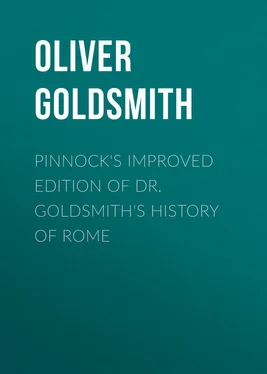Oliver Goldsmith - Pinnock's improved edition of Dr. Goldsmith's History of Rome
Здесь есть возможность читать онлайн «Oliver Goldsmith - Pinnock's improved edition of Dr. Goldsmith's History of Rome» — ознакомительный отрывок электронной книги совершенно бесплатно, а после прочтения отрывка купить полную версию. В некоторых случаях можно слушать аудио, скачать через торрент в формате fb2 и присутствует краткое содержание. Издательство: Иностранный паблик, Жанр: foreign_antique, foreign_prose, на английском языке. Описание произведения, (предисловие) а так же отзывы посетителей доступны на портале библиотеки ЛибКат.
- Название:Pinnock's improved edition of Dr. Goldsmith's History of Rome
- Автор:
- Издательство:Иностранный паблик
- Жанр:
- Год:неизвестен
- ISBN:нет данных
- Рейтинг книги:4 / 5. Голосов: 1
-
Избранное:Добавить в избранное
- Отзывы:
-
Ваша оценка:
- 80
- 1
- 2
- 3
- 4
- 5
Pinnock's improved edition of Dr. Goldsmith's History of Rome: краткое содержание, описание и аннотация
Предлагаем к чтению аннотацию, описание, краткое содержание или предисловие (зависит от того, что написал сам автор книги «Pinnock's improved edition of Dr. Goldsmith's History of Rome»). Если вы не нашли необходимую информацию о книге — напишите в комментариях, мы постараемся отыскать её.
Pinnock's improved edition of Dr. Goldsmith's History of Rome — читать онлайн ознакомительный отрывок
Ниже представлен текст книги, разбитый по страницам. Система сохранения места последней прочитанной страницы, позволяет с удобством читать онлайн бесплатно книгу «Pinnock's improved edition of Dr. Goldsmith's History of Rome», без необходимости каждый раз заново искать на чём Вы остановились. Поставьте закладку, и сможете в любой момент перейти на страницу, на которой закончили чтение.
Интервал:
Закладка:
2. The first tribes were divided by Ro'mulus into thirty cu'riæ, and each cu'ria contained ten gentes or associations. The individuals of each gens were not in all cases, and probably not in the majority of instances, connected by birth; 26 26 The same remark may be applied to the Scottish clans and the ancient Irish septs, which were very similar to the Roman gentes . When the plebeians endeavoured to procure the repeal of the laws which prohibited the intermarriage of the patricians and plebeians, the principal objection made by the former was, that these rights and obligations of the gentes (jura gentium) would be thrown into confusion. This was also the case with the Irish tanists, or chiefs of septs; the people elected a tanist, but their choice was confined to the members of the ruling family. See Historical Miscellany Part III. Chap. i. They were called "patres nunorum gentium," the senators of the inferior gentes. The "comitia curiata," assembled in the comi'tium, the general assemblies of the people were held in the forum. The patrician curiæ were called, emphatically, the council of the people; (concilium populi;) the third estate was called plebeian, (plebs.) This distinction between populus and plebs was disregarded after the plebeians had established their claim to equal rights. The English reader will easily understand the difference, if he considers that the patricians were precisely similar to the members of a close corporation, and the plebeians to the other inhabitants of a city. In London, for example, the common council may represent the senate, the livery answer for the populus, patricians, or comitia curiata, and the general body of other inhabitants will correspond with the plebs. There were certain sacrifices which the Romans believed could only be offered by a king; after the abolition of royalty, a priest, named the petty sacrificing king, (rex sacrificulus,) was elected to perform this duty. Perhaps it would be more accurate to say the exclusive right of legislation; for it appears that the comitia centuriata were sometimes summoned to give their sanction to laws which had been previously enacted by the curiæ. See Chap. XII. The Romans were previously acquainted with that great principle of justice, the right of trial by a person's peers. In the earliest ages the patricians had a right of appeal to the curiæ; the Valerian laws extended the same right to the plebeians. The senators were called conscript fathers, (patres conscripti,) either from their being enrolled on the censor's list, or more probably from the addition made to their numbers after the expulsion of the kings, in order to supply the places of those who had been murdered by Tarquin. The new senators were at first called conscript, and in the process of time the name was extended to the entire body.
the attributes of the members of a gens , according to Cicero, were, a common name and participation in private religious rites; descent from free ancestors; the absence of legal disqualification. 3. The members of these associations were united by certain laws, which conferred peculiar privileges, called jura gentium; of these the most remarkable were, the succession to the property of every member who died without kin and intestate, and the obligation imposed on all to assist their indigent fellows under any extraordinary burthen. 27 27 When the plebeians endeavoured to procure the repeal of the laws which prohibited the intermarriage of the patricians and plebeians, the principal objection made by the former was, that these rights and obligations of the gentes (jura gentium) would be thrown into confusion. This was also the case with the Irish tanists, or chiefs of septs; the people elected a tanist, but their choice was confined to the members of the ruling family. See Historical Miscellany Part III. Chap. i. They were called "patres nunorum gentium," the senators of the inferior gentes. The "comitia curiata," assembled in the comi'tium, the general assemblies of the people were held in the forum. The patrician curiæ were called, emphatically, the council of the people; (concilium populi;) the third estate was called plebeian, (plebs.) This distinction between populus and plebs was disregarded after the plebeians had established their claim to equal rights. The English reader will easily understand the difference, if he considers that the patricians were precisely similar to the members of a close corporation, and the plebeians to the other inhabitants of a city. In London, for example, the common council may represent the senate, the livery answer for the populus, patricians, or comitia curiata, and the general body of other inhabitants will correspond with the plebs. There were certain sacrifices which the Romans believed could only be offered by a king; after the abolition of royalty, a priest, named the petty sacrificing king, (rex sacrificulus,) was elected to perform this duty. Perhaps it would be more accurate to say the exclusive right of legislation; for it appears that the comitia centuriata were sometimes summoned to give their sanction to laws which had been previously enacted by the curiæ. See Chap. XII. The Romans were previously acquainted with that great principle of justice, the right of trial by a person's peers. In the earliest ages the patricians had a right of appeal to the curiæ; the Valerian laws extended the same right to the plebeians. The senators were called conscript fathers, (patres conscripti,) either from their being enrolled on the censor's list, or more probably from the addition made to their numbers after the expulsion of the kings, in order to supply the places of those who had been murdered by Tarquin. The new senators were at first called conscript, and in the process of time the name was extended to the entire body.
4. The head of each gens was regarded as a kind of father, and possessed a paternal authority over the members; the chieftancy was both elective and hereditary; 28 28 This was also the case with the Irish tanists, or chiefs of septs; the people elected a tanist, but their choice was confined to the members of the ruling family. See Historical Miscellany Part III. Chap. i. They were called "patres nunorum gentium," the senators of the inferior gentes. The "comitia curiata," assembled in the comi'tium, the general assemblies of the people were held in the forum. The patrician curiæ were called, emphatically, the council of the people; (concilium populi;) the third estate was called plebeian, (plebs.) This distinction between populus and plebs was disregarded after the plebeians had established their claim to equal rights. The English reader will easily understand the difference, if he considers that the patricians were precisely similar to the members of a close corporation, and the plebeians to the other inhabitants of a city. In London, for example, the common council may represent the senate, the livery answer for the populus, patricians, or comitia curiata, and the general body of other inhabitants will correspond with the plebs. There were certain sacrifices which the Romans believed could only be offered by a king; after the abolition of royalty, a priest, named the petty sacrificing king, (rex sacrificulus,) was elected to perform this duty. Perhaps it would be more accurate to say the exclusive right of legislation; for it appears that the comitia centuriata were sometimes summoned to give their sanction to laws which had been previously enacted by the curiæ. See Chap. XII. The Romans were previously acquainted with that great principle of justice, the right of trial by a person's peers. In the earliest ages the patricians had a right of appeal to the curiæ; the Valerian laws extended the same right to the plebeians. The senators were called conscript fathers, (patres conscripti,) either from their being enrolled on the censor's list, or more probably from the addition made to their numbers after the expulsion of the kings, in order to supply the places of those who had been murdered by Tarquin. The new senators were at first called conscript, and in the process of time the name was extended to the entire body.
that is, the individual was always selected from some particular family.
Интервал:
Закладка:
Похожие книги на «Pinnock's improved edition of Dr. Goldsmith's History of Rome»
Представляем Вашему вниманию похожие книги на «Pinnock's improved edition of Dr. Goldsmith's History of Rome» списком для выбора. Мы отобрали схожую по названию и смыслу литературу в надежде предоставить читателям больше вариантов отыскать новые, интересные, ещё непрочитанные произведения.
Обсуждение, отзывы о книге «Pinnock's improved edition of Dr. Goldsmith's History of Rome» и просто собственные мнения читателей. Оставьте ваши комментарии, напишите, что Вы думаете о произведении, его смысле или главных героях. Укажите что конкретно понравилось, а что нет, и почему Вы так считаете.











